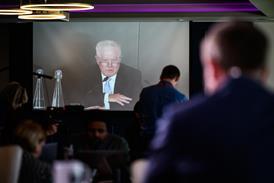Ministers should spend a day seeing justice on the ground.
Anyone still looking for holiday reading could do a lot worse than Adam Kay’s brilliant - albeit horrifying - diary of a junior doctor. This Is Going To Hurt will make you wince, cry and rage in equal measure, and features a brilliant idea for politicians of all hues.
Kay urges ministers to join doctors and nurses on a typical day – not putting on scrubs for a 10-minute photogenic walk on the wards, but embedding a 12-hour shift where a toilet break is considered a luxury.
I don’t deny justice ministers their summer hols, but I’d hope they might adopt this approach during their time away from Westminster.
Earlier this month I spent an afternoon in a court in North Wales where people appealed against DWP decisions to remove their disability benefit. The premise was a forthcoming feature on pop-up courts but the hearings themselves are worthy of comment on their own. It’s difficult to think of a more brutal, miserable and wretched setting than the SSCS tribunal. Desperate people, almost always fragile and in tears, must appear in front of a three-pronged panel which will decide whether they should receive extra state help.
It’s a sign of their desperation that they put themselves through this ordeal at all. In my experience the court staff were outstanding, from the clerk offering a mobile to help send a document to the tribunal judges doing their best to put claimants at ease. They were necessarily clinical at times, as they probed individuals on their bathroom habits, depressive feelings and the deaths of loved ones. But the judges were sympathetic and patient throughout.
Neither claimant I watched going through this ordeal had a solicitor with them: one was flanked by a charity worker, the other appeared alone. She was a widow and felt so ashamed of the experience she hadn’t even told her daughter she was appearing before the tribunal. It was harrowing to watch, never mind experience first-hand. These were members of society who go unnoticed, largely trapped at home in their own intolerable lives.
The process is what it is: the state deems some people ineligible for certain benefits and this is one way to ensure they can challenge such decisions. But it was impossible not to be affected by watching people go through such trauma, alone and in an alien environment.
I suggest ministers visit these hearings, not staged tours of shiny new courts, to see justice on the ground. They should know that when they close a court, when they create a system which sends appeals soaring, or when they deny someone legal representation, there is a consequence. No decision should be made without seeing the whites of someone’s eyes. It might just be enough to change their minds.



























2 Readers' comments